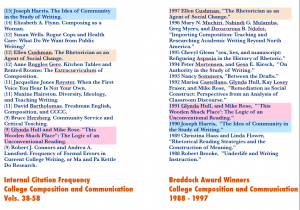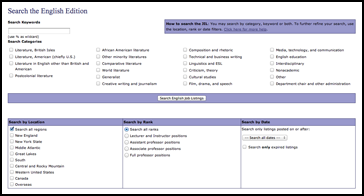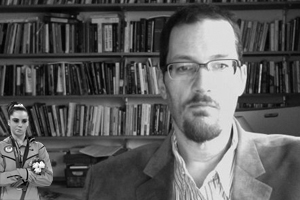What follows is a fairly rough approximation of the talk that I gave at the UK Networked Humanities Conference (#nhuk) in February, 2013. I don’t usually script out my talks in quite the level of detail that I have below, but this time out, I struggled to get my thoughts together, and scripting seemed to help. As usually happens with me, though, I went off-script early and often.
Also, I use a lot of slide builds to help pace myself, so I’m not providing a full slide deck here. Instead, I’m inserting slides where they feel necessary, and removing my deck cues from the script itself. I’m also interspersing some comments, based on the performance itself.
I’ll start with the panel proposal that Casey Boyle (@caseyboyle), Brian McNely (@bmcnely) and I put together:
Title: Networks as Infrastructure: Attunement, Altmetrics, Ambience
Panel Abstract: In his early 2012 discussion of the digital humanities, Stanley Fish examines a number of recent publications in the field, and arrives at the conclusion that DH is not only political but “theological:”
The vision is theological because it promises to liberate us from the confines of the linear, temporal medium in the context of which knowledge is discrete, partial and situated — knowledge at this time and this place experienced by this limited being — and deliver us into a spatial universe where knowledge is everywhere available in a full and immediate presence to which everyone has access as a node or relay in the meaning-producing system.
Fish connects this diagnosis of DH with Robert Coover’s 20-year-old call for the “End of Books,” itself once a clarion call to practitioners and theorists of hypertext. While there is perhaps an implicit promise in some digital humanities work that we will be able to move beyond and/or better our current circumstances, we would argue that Fish’s dismissal of that work is misguided at best. The digital humanities broadly, and this panel more specifically, offers a careful revaluation of our current practices, treating the social, material, and intellectual infrastructures of the academy as objects of inquiry and transformation. Rather than seeing these long-invisible networks as given or as something to be “ended” and transcended, we follow Cathy Davidson’s call to engage with them critically, “to reconsider the most cherished assumptions and structures of [our] discipline[s].”
And here’s my contribution to this panel, titled “The N-Visible College: Trading in our Citations for RTs”
I want to start today by referencing two essays that I published last year. The first is an essay called “Discipline and Publish: Reading and Writing the Scholarly Network.” It appears in a collection edited by Sidney Dobrin called Ecology, Writing Theory and New Media, published by Routledge.
The second essay is a bit shorter, and appeared on my blog in July of last year. “Cs Just Not That Into You” was a response to the acceptance notifications from 4Cs, the annual conference in rhetoric and composition. In the space of roughly 24 hours, this essay received over 500 views, 100 comments on Facebook and my blog, and at least 20 retweets and shares.
Both essays grew out of my interest in the intellectual and organizational infrastructures of disciplines, and what network studies can tell us about those structures, but when it comes to my department and my discipline, only one of these essays really counts. I don’t think I’m revealing any great secrets when I say that only one of them appeared in my annual review form this year.
As folks who were there can attest, I actually scrapped this intro on the fly, since Byron Hawk’s presentation actually referenced “Discipline and Publish.” So instead I went meta, talking about how I was going to open the talk, right up until the point that Byron ruined it for me by citing the very essay I was going to claim would never be cited.
I’d be lying if I didn’t admit that I find disappointing the fact that more people read and engaged with that blog post than will likely ever read “Discipline and Publish.” Routledge has library-priced the collection at a cool $130, meaning that it won’t be taught in courses, at least not legally. As much as I like the collection, I can hardly recommend it to friends and colleagues at that price. From the perspective of my institution, “Discipline and Publish” was probably my best piece of scholarship last year, but it’s also the one with the least value to me personally and professionally.
This question of relative value is one that has frustrated those of us who work closely in and with new media for years. There has been some progress in the form of organizational statements about the value of technology work, and some of us have pushed at the boundaries of our individual tenure and promotion requirements. But that progress has been slow, not the least reason for which is the patterned isolation that separates our disciplines, our institutions, and our departments. But I’ll get to that in a couple of minutes.
First, I want to offer one more example that raises this question of value. When Derek Mueller (@derekmueller) and I worked on the online archive for College Composition and Communication, one of the things we did was to track the internal citations of that journal. That is, whenever one essay from the journal cited another, we linked them together. So this list represents the 11 most frequently cited essays from CCC spanning roughly a 20-year period, ranked by the number of citations.
Compare that to the list of Braddock Award winners from the same time period. The Braddock Award is the prize for the best essay published in CCC in a given year. As you can see, there is some overlap between the lists, but there are substantial differences as well.

[beyond my scope today, but it’s interesting to think about how and why an essay might show up on one list and not the other, or on both lists]
For my purposes today, one of the most important differences between these lists is that our institutions are far more likely to recognize the Braddock Award as a sign of value than a handful of citations.
All of this is not to say that one of these lists is better than the other, but rather that we have different measures for value. If we think about this in terms of culture industries, this idea makes complete sense. There’s a substantial difference between the books that win literary prizes and those that top the New York Times bestseller lists. The top grossing movies for a given year don’t usually receive Academy Award nominations. We’re both comfortable and conversant with the different definitions of value that these lists and awards represent.
I had several slides here to slow myself down, with book covers and movie posters to help the contrast below between Best and Most. Copyright violations, every last one of them. So use your imagination. 🙂
This is horribly overreductive, I know, but I’ve been thinking about these two models of value as Best and Most. And much of our intellectual infrastructure in the humanities is targeted towards the idea of Best:
It operates on the principles of scarcity and selectivity, with the goal of establishing a stable, centralized core of recognizable activity. This model is a particularly strong one for fields in the early stages of disciplinarity–it creates shared values and history, as well as an institutional memory. On top of that, it’s a pretty easy model to implement.
But this model has some weaknesses as well. The larger a field becomes, the harder this model is to maintain. The center becomes conservative, slow to recognize or respond to change, and less and less representative of the majority of its members.
In some ways, what I’m calling Most runs counter to these principles. This model of value is collective rather than selective, focusing on the aggregation of abundance instead of scarcity. This model scales well with the size of a discipline–the more people and texts there, the better the information becomes.
If there’s a weakness to this model, it’s that it requires a lot more infrastructure and information to be productive. And it’s something of a chicken/egg problem: it’s hard to demonstrate the value of this model and to advocate for it without the model already in place.
Over the past couple of years though, we’ve seen a push towards something called altmetrics. Spearheaded by scholars in library and information studies, altmetrics is a term with several different layers. On the one hand, it refers to opening up traditional measures of value for alternative research products, like datasets, visualizations, and the like. On the other, altmetric advocates have also been pushing for measures other than the traditional (and flawed) idea of journal impact factor.
But there’s another layer to this term at well, one that gets at the questions of approved genres and recognizable metrics from a more ecological perspective. That is, altmetrics is only partly about reforming our current system; it’s also encouraging us to rethink the system itself. One of the leading voices in altmetrics, Jason Priem (@jasonpriem), gave a talk at Purdue last year where he talked about something called the Decoupled Journal.
I’m embarrassed to admit that, running out of time, I swiped three of the diagrams from Jason Priem’s slideshow. I’m hoping that the links here serve as sufficient apology. I’d hoped to adapt them to my own purposes and disciplinary circumstances, but I was putting the final movement together on the road, and took the shortcut. I also quoted (and attributed) the line that we’re currently working with the best possible system of scholarly communication given 17th century technology, which got both a chuckle from the room and a fair share of retweets.
Traditional journal system, where each journal is responsible for each stage of the publication process.
This traditional process is a masterpiece of patterned isolation — very little interaction from journal to journal — except when journals are owned by the same corporation. There’s tremendous duplication of effort, and that effort is stretched over a long period of time in the case of most traditional journals.
Thanks to blind peer review, most reviewers are isolated from each other as well, as are the contributors. It isn’t until you reach the top of the pyramid, with the journal editor, that there’s any kind of conversation or cross-pollenation of ideas and research. It’s a top-down model of scholarly communication.
I’m pretty sure I was completely off-script through here. I did remember to emphasize the idea that our current model is a “masterpiece of patterned isolation,” but I’m pretty sure that I forgot to mention at any point that PI is a phrase I’ve pulled from Gerald Graff, who borrows it from Laurence Veysey. Pretty sure I never defined it, either.
What Priem suggests is that we think about the various layers and practices independently of how they’ve traditionally been distributed. Social media in particular have opened up a number of possibilities for engaging with and assessing scholarship; rather than waiting for our journals to adopt these practices, altmetricians would have us begin exploring and applying them ourselves.
Considering that many journals treat promotion and search as somehow accomplished by their subscriber list and a conference booth or two, there’s a great deal of room for innovation. Priem describes this decoupled model as publishing a la carte. He offers an example of a writer who might place an essay in a journal, but choose a number of alternative methods for promoting it, making it findable, having it reviewed, etc.
Cheryl Ball (@s2ceball) called me out in Q&A for being too cavalier about the shift in my talk from the “Decoupled Journal” to DH Now, and she was absolutely right. What I was trying to get at here was the way that DHNow starts from a different set of questions, and thus “couples” the process in a way that accomplishes both “Most” and “Best” without buying in to the traditional model of what a journal should look like. This is also where my script simply turns into talking points.
DH Now
- Aggregation of tweets, calls for papers, job announcements, and resources
- Monitor the network for spikes in activity
- Cross-post and RT the things that folks are paying attention to
- Added layer of publication: Editors’ Choice
- EC texts are solicited for the quarterly Journal of Digital Humanities
- Publication is the final step of a fairly simple, but widely distributed process
Why it’s useful as a model
- Process produces much closer relationship between the map and the territory – DH Now vs DH 2 years ago
- Driven by engagement and usefulness to the community rather than obscure standards administered anonymously
- That engagement occurs much more quickly, and at all stages of the process — publication becomes evidence of engagement rather than a precondition for it
Conclusion
Deleted Scenes
You might notice that there’s no reference at all here to my original title. As I was planning the talk, I’d intended to frame it with a three-part movement from invisible college to discipline to what I was calling the “n-visible college” (network-visible), a model of scholarly communication that preserved disciplinary memory but not at the cost of innovation and circulation. My CCCC talk from several years ago (this link is to QT movie of the talk) gestures towards that model, but to my mind Priem’s work in particular gets at it much more concretely.
Also, I didn’t emphasize enough the degree to which our traditional model has as a default the silos or smokestacks that separate us all (journals, disciplines, individuals) from each other. This may be part of my underemphasis on patterned isolation. Our current model keeps us silo’ed by default–to my mind, open access isn’t just a matter of taking down those walls, but in reimagining the system that defaults to silo in the first place. Nate Kreuter (@lawnsports) talked a little bit about this the following day in terms of considering both material and cognitive accessibility. We can make our work open materially, but without an infrastructure that makes it accessible cognitively, we’re not doing as much as we should be.
I spent way too much of my inventional time trying to figure out how to incorporate an essay from Noah Wardrip-Fruin on interface effects. It fit with what I wanted to say, which is that the “interface” of the Braddock essays fails us in that it gives very little sense of the complexity of the field that it represents. Love this line from NWF: “Just as play will unmask a simple process with more complex pretensions, so play with a fascinating system will lack all fascination if the system’s operations are too well hidden from the audience.” My point is that, at a certain disciplinary scale, holding to notions of the “Best” ends up occluding more of our scholarly activity than it reveals. It’s a point I like, but I just couldn’t get there from here. And it may be too intricate for the kind of talk that I give.
Finally, Nathaniel Rivers (@sophist_monster)asked a good question in Q&A that went something like “what happens if you succeed?” In other words, have we really thought through what it would mean if Facebook likes or retweets acquired currency. My answer was that it was less about replacing our current system with a better one than it was about opening the system up to the competing models of value that are currently neglected.
And that’s really all that I can remember. Like I said, this is a fair approximation, although not likely a perfect one. If you’ve read this far, thanks! And thanks to all those who chatted with me before, during, and after.


